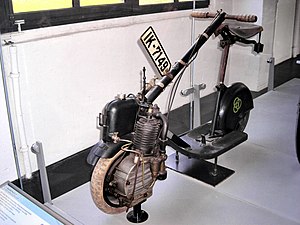Autoped
 | |
| Manufacturer | Autoped Company, Krupp |
|---|---|
| Also called | Krupp-Roller |
| Production | 1915–1921 (Autoped) 1919–1922 (Krupp) |
| Class | Motor scooter Motorized scooter |
| Engine | 155 cc (9.5 cu in) air-cooled single (Autoped) 191 cc (11.7 cu in) air-cooled single (Krupp) |
| Bore / stroke | 56 mm × 63 mm 2.2 in × 2.5 in (Autoped) |
| Top speed | 20 mph (32 km/h) (Autoped) 22 mph (35 km/h) (Krupp) |
| Power | 1.1 kW (1.5 hp) (Autoped) 1.3 kW (1.7 hp) (Krupp) |
| Ignition type | Flywheel magneto[1] |
| Transmission | clutch operated by handlebar column |
| Frame type | welded steel |
| Suspension | none |
| Tires | 10 inches (250 mm) |
The Autoped was an early motor scooter or motorized scooter manufactured by the Autoped Company of Long Island City, New York[2] from 1915 to 1922.[3][4]
The driver stood on a platform with 10-inch tires and operated the machine using only the handlebars and steering column, pushing them forward to engage the clutch, using a lever on the handlebar to control the throttle, and pulling the handlebars and column back to disengage the clutch and apply the brake.[1][2][3][4] After riding, the steering column would be folded onto the platform to store the scooter more easily. The engine was an air-cooled, 4-stroke, 155 cc engine over the front wheel.[2][3] The bike came with a headlamp and tail lamp, a Klaxon horn, and a toolbox. It was quite efficient, but was not widely distributed.[2]
A patent for the Autoped as a "self-propelled vehicle" was applied for in July 1913 and granted in July 1916.[5][6] An early description of the Autoped described it as having a hollow steering column that acted as the fuel tank.[7] However, the production version had a fuel tank above the front mudguard.[3]
The Autoped went out of production in the United States in 1921, but was manufactured by Krupp in Germany from 1919 to 1922.[3][8]
-
Historical photo of an Autoped in use by a traffic cop in Newark, New Jersey, 1922
-
Krupp licence-built Autoped with seat
See also
References
- ^ a b Partridge 1976, p. 70.
- ^ a b c d Johnston.
- ^ a b c d e Wilson 1995, p. 22.
- ^ a b Jacquet.
- ^ Gibson 1916.
- ^ U.S. patent 1,192,514
- ^ Windsor 1914, p. 163.
- ^ Wilson 1995, p. 243.
Bibliography
- Jacquet, Florian (ed.). "ScooterManiac – Autoped". ScooterManiac. Florian JACQUET, webmaster. Archived from the original on 2011-07-24. Retrieved 2010-08-28.
- Johnston, Paul F. (ed.). "America On The Move – Pope, Cleveland, Autoped, and Simplex". America On The Move. Smithsonian National Museum of American History. Archived from the original on 2012-10-19. Retrieved 2009-05-17.
- Partridge, Michael (1976). "1916 13⁄4 hp Autoped Scooter". Motorcycle Pioneers: The Men, the Machines, the Events 1860–1930. David & Charles (Publishers). pp. 70–71. ISBN 0 7153 7 209 2.
- US patent 1192514, Gibson, Arthur Hugo Cecil, "SELF-PROPELLED VEHICLE", issued 1916-07-25, assigned to Auto-Ped Company of America
- Wilson, Hugo (1995). The Encyclopedia of the Motorcycle. London: Dorling Kindersley. ISBN 0-7513-0206-6.
- Windsor, H. H., ed. (August 1914). "New Power Vehicle Built on Unique Lines". Popular Mechanics. 22 (2). Hearst Magazines: 163. ISSN 0032-4558.
The engine, 21⁄2 hp., is built in the front wheel, and the steering pillar is hollow, serving also as the gasoline-supply tank.
- "Autoped Scooter by Imperial Motors".
External links
 Media related to Autoped scooters at Wikimedia Commons
Media related to Autoped scooters at Wikimedia Commons


